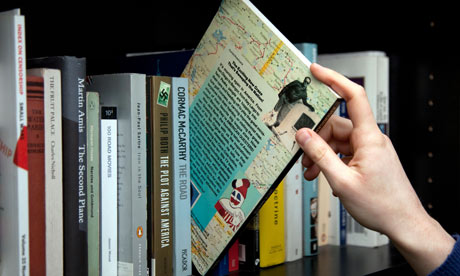
I'm very bad at getting rid of books. As a child I argued with increasing shrillness, eventually resorting to night-raids on crates marked for disposal, to preserve long-outgrown picture books and baby reading (I feel slightly vindicated now that my daughter is enjoying my faded, fraying Mog books and Ahlbergs. But moving day, alas, draws on apace, as doth the evil hour when I'll have to take the shears to my sprawling collection in earnest. I can save most of the children's books (again) by the simple expedient of shoving them onto the littl'un's shelf – she can't argue convincingly yet – and calling them hers. Multiple copies, junk-food reads and substantial classics I'll admit, with a sigh of shamed relief, that I'm never going to get round to reading - charity shop ho, my chicks.
The prospect of purging talismanic texts, though – books I'm unlikely ever to open again, but which I superstitiously believe exhale helpful knowledge or distilled memory – is harder. These finger-prickling, magical objects include several cloth-bound volumes of Latin poetry, ancient stock bought secondhand or absent-mindedly liberated from school bookcases (sorry, Mrs McDonough). A few proclaim via age-spotted plates that they were speech-day prizes for diligent girls and boys. I'm never going to sit down and study them again, unless I slip through a timewarp and get the Pro Plus palpitations retaking my finals. But I might, in some unspecific emergency, still need them. And I love them, even unopened. I remember that some have careful, bowdlerising glosses, fitting rude and sparkling verse for the innocent eye of youth – some even resort to asterisks in particularly racy sections. They are old and crumbly and useless, their dye comes off on your fingers, and they're leaving my collection over my dead body.
Other books I could never consign to the recycling include half a dozen scribbled and maltreated play scripts, bent backwards, frantically doodled and defaced into illegibility; entirely useless for reading, but transporting me instantly to the rehearsal room with one glimpse of their covers. Like the Latin books, they're no longer texts so much as tiny time machines – handling them zips me back with a jolt to obsessions with the precise length of a Pinter "pause" as opposed to "silence'" or weighing up how many lamb's hearts you need to last a week-long run of 'Tis Pity She's a Whore, with two matinees. (The answer is one per performance - otherwise they work down the blade, or go off and knock out the front three rows with their stench.)
As I begin packing up my books – or rather, sit cross-legged and read between guilty, frenetic bursts of packing – I know another pile of talismanic volumes will appear at my elbow. Which are your talismanic books, never opened now but never to be disposed of? And what do they represent?

